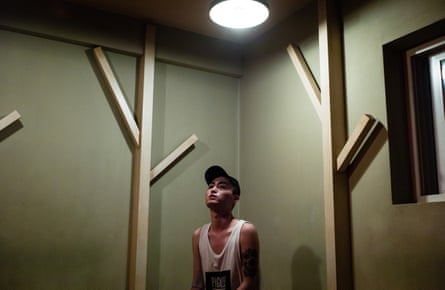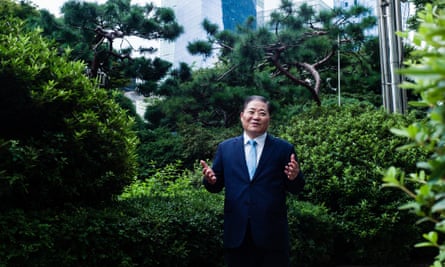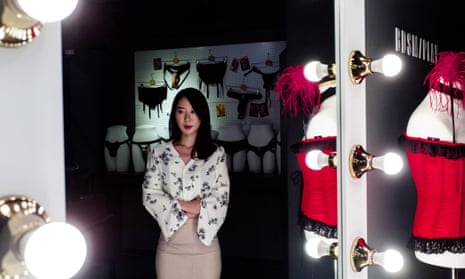When Lin Yu-han has a successful date, she uses Twitter to talk about it. Other times she simply calls for her followers to shed South Korea’s conservative social mores and have a bit more fun.
“Why do you need to be engaged or feel some deep responsibility to have sex?” she wrote. “If they’re hotties with bodies just hop on.”
“Who cares about goddamn attachment,” Lin wrote in another post, adding an expletive-filled sentence that expressed her hatred of men who underperform in bed. “From now on, I’ll try them out and if the sex is bad, I’m never gonna meet them again.”
Lin is part of a grassroots sexual revolution sweeping South Korea, where a deeply conservative society is beginning to loosen up when it comes to sex, and women are challenging centuries of strict gender roles in relationships.
Long held taboos around sex are rapidly melting away, giving rise to more casual relationships and less focus on marriage, while doctors have seen a sharp increase in the number of patients asking for contraceptives.
“A lot of people still think a woman talking about sex in public is bad, while men talk about sex all the time,” Lin said in an interview in Seoul’s upmarket Gangnam neighbourhood. “I just want to break that.”
The 34-year-old has been chronicling her relationships and thoughts on sex for more than two years, originally with the aim of encouraging other young women to be more independent. She believes that as South Korea’s economic growth has plateaued, marrying young has become less important, leaving more room for casual relationships.
Many in Seoul are still shy when discussing sex, and Korean uses a host of English loan words for terms including “penis”, “adult shop” and even “sex” itself. Despite the country having some of the fastest internet in the world, the government regularly censors online pornography, placing it on the same level as gambling and North Korean propaganda.
The most conspicuous manifestation of South Korea’s newfound openness is a rash of sex shops that have sprung up across Seoul, the latest fad in a country that latches on to trends with particular ferocity.
Pleasure Lab, in the fashionable tree-lined Dosan neighbourhood, mainly focuses on women, and its founder, Eura Kwak, a former nurse, holds regular educational seminars.
With Kendrick Lamar on the sound system and a clean, minimalist design, the shop tries to shake the seedy image most associate with sex toys. Staff ensure every customer receives a pamphlet with a detailed drawing showing the location of the clitoris.
“It’s difficult for women to take a leading role in South Korean society when it comes to sex,” Kwak said. “Men always took the lead in sex, which meant for a long time sexuality for women did not exist.”
“Giving pleasure isn’t shameful, but in Korean culture, when women talk about pleasure people will call her a whore,” she added.
In a sign of lingering conservative attitudes, South Korea’s most popular search engine, Naver, has blocked results for searches for the store’s name, forcing Kwak to place a sticker on each item explaining how to circumvent the ban.
“Without people like us, people’s perception of sex wouldn’t have changed. It’s not about the mood of society allowing us to exist; it’s about spearheading a movement,” she said. “If businesses like us didn’t start, I think we’d be exactly where we were five years ago.”
‘Our community was underground for so long’
While portrayals of relationships in mainstream media remain largely chaste, there have been a few edgier programmes.
The television show Witch Hunt, which first aired in 2013, was known for its frank talk about sex and relationships, but was originally conceived as a programme to teach awkward men how to succeed in romance and all of the four hosts were male.
In March a show called Cranky Men and Women began airing with the explicit purpose of “talking honestly about gender stereotypes in everyday life”, and has been championed by prominent feminists.
In 2015 the country’s highest court ruled a 60-year-old law that banned adultery was illegal. The crime had been punishable by up to two years in prison, although jail time had become increasingly rare. The court had previously reviewed the law three times and kept it in place.

And others attribute the newfound sexual freedom to the rise of feminism in popular culture and increased visibility of sexual minorities fighting for equality.
Kuciia Diamant is an office worker at an e-commerce company by day, and Seoul’s most famous drag queen every weekend.
“Our community was underground for so long, but wanted to be a bridge to wider society,” Kuciia said.
Starting in 2015, the Korea queer culture festival was held in the heart of Seoul in a plaza outside city hall, bringing more attention and even a vocal contingent of protesters. In South Korea, a group of scantily clad men and women partying in front of a government building is national news.
“We’re making sex seem fun and more enjoyable,” Kuciia said. “There’s no event or leader. The change is coming from us, from individuals seeing and learning more about sexuality and gender issues, and expressions like drag performances are becoming more accepted.”
But South Korea’s large and vocal Christian community is alarmed by recent trends. Pastor So Kang-suk preaches often about the pitfalls of liberal attitudes towards sex and he is a frequent fixture at anti-LGBTI demonstrations.
“South Korea had been respecting its traditional values, but this such a radical change,” So said. “It’s going in the wrong direction.”

He likens the trend to the Summer of Love, when thousands of hippies espousing peace and free love descended on San Francisco in 1967.
His Sae Eden congregation, a megachurch in a Seoul suburb with 40,000 parishioners, has started hosting events aiming to teach people “sex is valuable, sex is precious”.
“People are sexual animals, but there must be ethical values in sex,” he said. “Even as this new openness comes at us like a flood, the youth that engages in free sex, if they look deep inside themselves they can’t say what they are doing is legitimate or proper.”
With additional reporting by Soeun Seo and Jake Kwon.

Comments (…)
Sign in or create your Guardian account to join the discussion